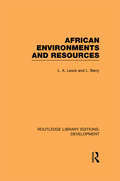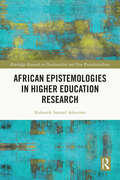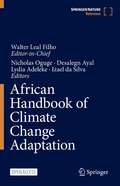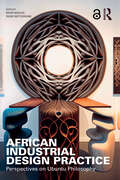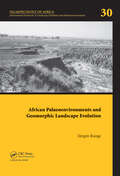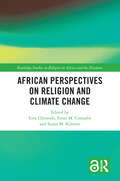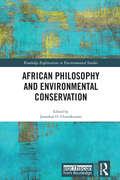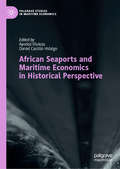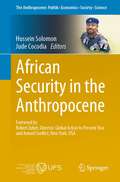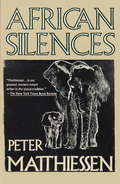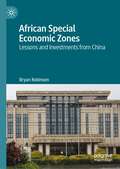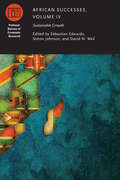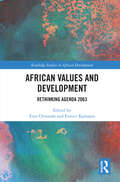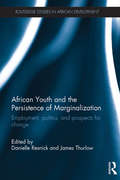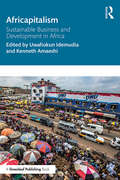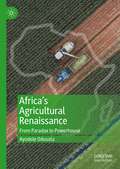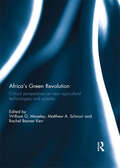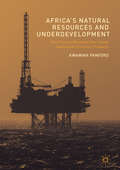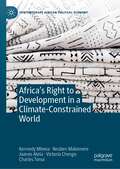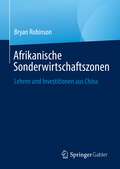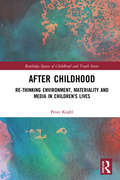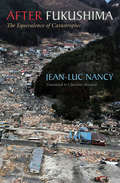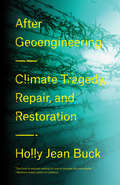- Table View
- List View
African Environments and Resources (Routledge Library Editions: Development)
by L. A. Lewis L. BerryFirst published in 1988, this work provides a comprehensive picture of the range of physical environments in Africa, focusing upon those characteristics and issues central to the management of environmental resources. Beginning with an overview of the geographical and environmental history of Africa, the authors also provide to the evolution of the management of resources and then details a broadly defined ecosystem approach, in which major environmental resource issues are identified and addressed in the tropical rainforest, the Savannah dry-forest, the arid and semi-arid areas, the highlands, and the extra-tropical zones of Northern and Southern Africa. The book is designed to contribute to a better understanding of African environmental and resource-management problems and this reissue should be welcomed by students of Africa and of environmental resource management problems in general.
African Epistemologies in Higher Education Research (Routledge Research on Decoloniality and New Postcolonialisms)
by Kolawole Samuel AdeyemoBringing a needed perspective on African Epistemologies on the critical topics of higher education in relation to knowledge systems, this book highlights how knowledge creation processes influence higher education systems, society, and African development. This book uses an interdisciplinary approach to frame the connections between academic knowledge systems. Specifically, it seeks to answer questions on the trends in knowledge mobility, histories, and sociological dimensions in knowledge production in post-colonial Africa. The discussion explores how existing knowledge systems can better align with past and present narratives throughout African history and philosophies. The primary thought behind this book is to deconstruct the idea of a free market, the issue of corruption, racism and the neoliberalist approach to knowledge creation and transmission. Thus, it seeks to answer questions on the history and sociological dimensions of knowledge production in higher education. The book argues that African epistemologies can be better understood by investigating present sociologies and histories shaping African higher education research. Researchers and university students in the field of sociology of education, economics of education, higher education and policy will find this book very useful.
African Handbook of Climate Change Adaptation
by Nicholas Oguge Desalegn Ayal Lydia Adeleke Izael Da SilvaThis open access book discusses current thinking and presents the main issues and challenges associated with climate change in Africa. It introduces evidences from studies and projects which show how climate change adaptation is being - and may continue to be successfully implemented in African countries. Thanks to its scope and wide range of themes surrounding climate change, the ambition is that this book will be a lead publication on the topic, which may be regularly updated and hence capture further works.Climate change is a major global challenge. However, some geographical regions are more severly affected than others. One of these regions is the African continent. Due to a combination of unfavourable socio-economic and meteorological conditions, African countries are particularly vulnerable to climate change and its impacts. The recently released IPCC special report "Global Warming of 1.5º C" outlines the fact that keeping global warming by the level of 1.5º C is possible, but also suggested that an increase by 2º C could lead to crises with crops (agriculture fed by rain could drop by 50% in some African countries by 2020) and livestock production, could damage water supplies and pose an additonal threat to coastal areas. The 5th Assessment Report produced by IPCC predicts that wheat may disappear from Africa by 2080, and that maize— a staple—will fall significantly in southern Africa. Also, arid and semi-arid lands are likely to increase by up to 8%, with severe ramifications for livelihoods, poverty eradication and meeting the SDGs. Pursuing appropriate adaptation strategies is thus vital, in order to address the current and future challenges posed by a changing climate. It is against this background that the "African Handbook of Climate Change Adaptation" is being published. It contains papers prepared by scholars, representatives from social movements, practitioners and members of governmental agencies, undertaking research and/or executing climate change projects in Africa, and working with communities across the African continent. Encompassing over 100 contribtions from across Africa, it is the most comprehensive publication on climate change adaptation in Africa ever produced.
African Industrial Design Practice: Perspectives on Ubuntu Philosophy
by Richie Moalosi Yaone RapitsenyaneThe underlying principle of this book is the African philosophy of Ubuntu, which acts as a guide for developing empathic products and services. The book makes the case that empathy is the key to any successful product and service design project because it enables designers to make wise design choices that align with users' demands. Fifteen chapters provide the latest industrial design developments, techniques, and processes explicitly targeting emerging economies. At the outset, it covers the design context and the philosophy of the Ubuntu approach, which places people and communities at the centre of the development agenda. The book covers new product development, design research, design cognition, digital and traditional prototyping, bringing products to the market, establishing a company's brand name, intellectual property rights, traditional knowledge, and the business case for design in Afrika. It concludes with a discussion about the future of design and the skills aspiring designers will need. African Industrial Design Practice: Perspectives on Ubuntu Philosophy will be an essential textbook for undergraduates, postgraduates, instructors, and beginner designers in emerging economies to provide regionally contextualised design processes, illustrated examples, and outcomes.
African Industrial Design Practice: Perspectives on Ubuntu Philosophy
by Richie Moalosi Yaone RapitsenyaneThe underlying principle of this book is the African philosophy of Ubuntu, which acts as a guide for developing empathic products and services. The book makes the case that empathy is the key to any successful product and service design project because it enables designers to make wise design choices that align with users' demands.Fifteen chapters provide the latest industrial design developments, techniques, and processes explicitly targeting emerging economies. At the outset, it covers the design context and the philosophy of the Ubuntu approach, which places people and communities at the centre of the development agenda. The book covers new product development, design research, design cognition, digital and traditional prototyping, bringing products to the market, establishing a company's brand name, intellectual property rights, traditional knowledge, and the business case for design in Afrika. It concludes with a discussion about the future of design and the skills aspiring designers will need.African Industrial Design Practice: Perspectives on Ubuntu Philosophy will be an essential textbook for undergraduates, postgraduates, instructors, and beginner designers in emerging economies to provide regionally contextualised design processes, illustrated examples, and outcomes.Chapter 2 of this book is freely available as a downloadable Open Access PDF at http://www.taylorfrancis.com under a Creative Commons Attribution-Non Commercial-No Derivatives (CC-BY-NC-ND) 4.0 license.
African Palaeoenvironments and Geomorphic Landscape Evolution: Palaeoecology of Africa Vol. 30, An International Yearbook of Landscape Evolution and Palaeoenvironments (Palaeoecology of Africa)
by Jürgen RungeThis 30st jubilee volume (2010) of "Palaeoecology of Africa" looks back and reflects the "state of the art" of what is actually known on former African climates and ecosystems in the format of review articles authored by specialists in the field. New research articles on climate and ecosystem dynamics as well as applied topics on geomorphic ha
African Perspectives on Religion and Climate Change (Routledge Studies on Religion in Africa and the Diaspora)
by Ezra Chitando, Ernst M. Conradie and Susan M. KilonzoThis book interrogates the contributions that religious traditions have made to climate change discussions within Africa, whether positive or negative. Drawing on a range of African contexts and religious traditions, the book provides concrete suggestions on how individuals and communities of faith must act in order to address the challenge of climate change. Despite the fact that Africa has contributed relatively little to historic carbon emissions, the continent will be affected disproportionally by the increasing impact of anthropogenic climate change. Contributors to this book provide a range of rich case studies to investigate how religious traditions such as Christianity, Hinduism, Islam, and indigenous faiths influence the worldviews and actions of their adherents. The chapters also interrogate how the moral authority and leadership provided by religion can be used to respond and adapt to the challenges posed by climate change. Topics covered include risk reduction and resilience, youth movements, indigenous knowledge systems, environmental degradation, gender perspectives, ecological theories, and climate change financing. This book will be of interest to scholars in diverse fields, including religious studies, sociology, political science, climate change and environmental humanities. It may also benefit practitioners involved in solving community challenges related to climate change.
African Philosophy and Environmental Conservation (Routledge Explorations in Environmental Studies)
by Jonathan O. ChimakonamAfrican Philosophy and Environmental Conservation is about the unconcern for, and marginalisation of, the environment in African philosophy. The issue of the environment is still very much neglected by governments, corporate bodies, academics and specifically, philosophers in the sub-Saharan Africa. The entrenched traditional world-views which give a place of privilege to one thing over the other, as for example men over women, is the same attitude that privileges humans over the environment. This culturally embedded orientation makes it difficult for stake holders in Africa to identify and confront the modern day challenges posed by the neglect of the environment. In a continent where deep-rooted cultural and religious practices, as well as widespread ignorance, determine human conduct towards the environment, it becomes difficult to curtail much less overcome the threats to our environment. It shows that to a large extent, the African cultural privileging of men over women and of humans over the environment somewhat exacerbates and makes the environmental crisis on the continent intractable. For example, it raises the challenging puzzle as to why women in Africa are the ones to plant the trees and men are the ones to fell them. Contributors address these salient issues from both theoretical and practical perspectives, demonstrating what African philosophy could do to ameliorate the marginalisation which the theme of environment suffers on the continent. Philosophy is supposed to teach us how to lead the good life in all its forms; why is it failing in this duty in Africa specifically where the issue of environment is concerned? This book which trail-blazes the field of African Philosophy and Environmental Ethics will be of great interest to students and scholars of Philosophy, African philosophy, Environmental Ethics and Gender Studies.
African Seaports and Maritime Economics in Historical Perspective (Palgrave Studies in Maritime Economics)
by Ayodeji Olukoju Daniel Castillo HidalgoThis book updates African maritime economic history to analyse the influence of seaports and seaborne trade, processes of urbanization and development, and the impact of globalization on port evolution within the different regions of Africa. It succeeds the seminal collection edited by Hoyle & Hilling which was conceived during a phase of sustained economic growth on the African continent, and builds on a similar trend where African economies have experienced processes of economic growth and the relative improvement of welfare conditions. It provides valuable insights on port evolution and the way the maritime sector has impacted the hinterland and the regional economic structures of the affected countries, including the several and varied agents involved in these activities. African Seaports and Maritime Economics in Historical Perspective will be useful for economists, historians, and geographers interested in African and maritime issues, as well as policy makers interested in path-dependence and long-term analysis
African Security in the Anthropocene (The Anthropocene: Politik—Economics—Society—Science #36)
by Hussein Solomon Jude CocodiaMuch has been written on security in Africa—its democratic deficit, poor civil-military relations, and myriad conflicts—but these are often treated in isolation from one another. This book takes a different approach, as it links all of these issues to the dynamics of the Anthropocene. Penned by African scholars on the continent and in the diaspora, it examines the different challenges not as separate entities but as outcomes of the Anthropocene Age. In this geological epoch, humans have become a global force—unfortunately, not necessarily for good. The interaction between humans and the climate, the effects of waste, the impact of pollution on marine and terrestrial ecosystems, the loss of biodiversity, and the change in the chemical composition of the soil, oceans and atmosphere are key identifiers of the age of the Anthropocene. This has fueled conflict and instability from the vast swathes of the Sahel to Somalia. Responding to these issues of insecurity without understanding their inter-connectedness and how this relates to the environment can only result in failure. From this perspective, the current structures in place are inadequate for the task of confronting insecurity at the state and continental levels, as represented by the African Union. What is needed is a radical reevaluation of Africa’s security architecture and approach to security. This necessitates pooling sovereignty on a continental and global level. It necessitates less state-centric responses that include civil society and the business community as equal partners of states in order to collectively confront insecurity in the age of the Anthropocene.• The authors are academics, policy makers and military veterans who have worked in building capacity on the African continent• The book is comprehensive in scope, strong on theory, pragmatic in policy and reflects experience from the field.• The authors approach makes the book easy, interesting and intriguing.
African Silences
by Peter MatthiessenAfrican Silences is a powerful and sobering account of the cataclysmic depredation of the African landscape and its wildlife. In this critically acclaimed work Peter Matthiessen explores new terrain on a continent he has written about in two previous books, A Tree Where Man Was Born -- nominated for the National Book Award -- and Sand Rivers.Through his eyes we see elephants, white rhinos, gorillas, and other endangered creatures of the wild. We share the drama of the journeys themselves, including a hazardous crossing of the continent in a light plane. And along the way, we learn of the human lives oppressed by bankrupt political regimes and economies, and threatened by the slow ecological catastrophe to which they have only begun to awaken.
African Special Economic Zones: Lessons and Investments from China
by Bryan RobinsonThis book evaluates African Special Economic Zones from the perspective of learning from China’s experiences with such Zones and the impact of Chinese policy and investment on African Zones. Utilising case studies of perceived successful Special Economic Zones in China, the book proposes the Chinese Model of Special Economic Zones as an evaluation and benchmarking tool against which African Special Economic Zones are considered. Applying several case studies on African Special Economic Zones, the book then details the competitiveness of African Special Economic Zones with a specific focus on attracting Chinese investors to these Zones. The economic, social and environmental impact of these zones are appraised. African Nations’ efforts, or lack thereof, to enable successful Special Economic Zones are critically analysed. Finally, Special Economic Zones in Africa are compared against the Chinese Model; and an African Model of Special Economic Zones is proposed. Recommendations are presented to both African Nations’ leadership and Chinese policymakers and investors as to how these Zones can be improved to enhance competitiveness and the attainment of the Zones’ sustainable development objectives.
African Successes, Volume IV: Sustainable Growth
by Simon Johnson Sebastian Edwards David N. WeilStudies of African economic development frequently focus on the daunting challenges the continent faces. From recurrent crises to ethnic conflicts and long-standing corruption, a raft of deep-rooted problems has led many to regard the continent as facing many hurdles to raise living standards. Yet Africa has made considerable progress in the past decade, with a GDP growth rate exceeding five percent in some regions. The African Successes series looks at recent improvements in living standards and other measures of development in many African countries with an eye toward identifying what shaped them and the extent to which lessons learned are transferable and can guide policy in other nations and at the international level. The fourth volume in the series, African Successes: Sustainable Growth combines informative case studies with careful empirical analysis to consider the prospects for future African growth.
African Values and Development: Rethinking Agenda 2063 (Routledge Studies in African Development)
by Ezra Chitando Eunice KamaaraThis book considers the importance of African values, not only in catalysing development, but in sustaining it. Arguing for an urgent need for rapprochement between African politicians and intellectuals, the book discusses how African values and identities can contribute to the successful realization of initiatives such as the African Union’s Agenda 2063 and the United Nation’s Sustainable Development Goals (SDGs). Over the course of the book, the authors consider key themes such as identity, indigenous and modern worldviews; personhood; individual and communal perspectives; peace and conflict; and well-being. The book explores the role of religion and moral values, as well as African worldviews such as Ubuntu. Overall, the book demonstrates that African values will be central to galvanising Africa’s post-colonial transformation. This book will be an important read for policymakers and for researchers working on African development, politics, sociology, religion and philosophy.
African Youth and the Persistence of Marginalization: Employment, politics, and prospects for change (Routledge Studies in African Development)
by Danielle Resnick James ThurlowThe much heralded growth and transformation of many economies in sub-Saharan Africa over the last decade continues to receive prominent attention in academic scholarship and among policy practitioners. An apparent feature about this transformation, however, is that Africa’s youth appear to have been left out. This book critically examines the extent and consequences of the marginalization of African youth. It questions conventional wisdoms about data trends, aspirational goals, and common policy interventions surrounding Africa’s youth that have been variously propagated in both the development studies literature and in mainstream donor policy reports. The book explores macro trends from both a temporal and cross-regional perspective in order to highlight what is distinct about contemporary African youth and whether their prospects and behaviours do actually vary from their counterparts in other regions of the world or from previous generations of African youth. Such studies include cross-country analyses of youth employment patterns and modes of political participation, in-depth examination of the behaviours and aspirations of the urban youth, and critical reflections on the impact of rural employment initiatives, vocational education, and learnership programmes. The incorporation of multiple methods and disciplines, as well as its attention to policy issues, ensures that the book will be of great interest to graduate students, researchers, and professional researchers whose work lies at the intersection of African area studies and development studies as well as those focused on development economics, political science, and public policy and administration.
Africapitalism: Sustainable Business and Development in Africa
by Kenneth Amaeshi Uwafiokun IdemudiaUsing theory, empirical research, and case studies, this book explores the changing nature of business in Africa and how businesses can actively contribute to the development of Africa. It uses (and critically analyses) the concept of Africapitalism – a management philosophy and movement which seeks to blend the best of African values and Western management theories as a basis for sustainable development in Africa – to understand the subtle factors that underpin business decisions in Africa. The collection of chapters in this book are organized around actors, issues, and reflections. They collectively present an account of Africapitalism, albeit from different perspectives and on different issues, and open up a new space for rethinking business and society relations in Africa from an Africapitalism perspective. Crucial is the critical engagement with both the discourse and practice of Africapitalism and its implications for sustainable development. It is anticipated that the challenges and opportunities highlighted by the book would be embraced by researchers, policy makers, and practitioners in the broad area of business and society in Africa. This multidisciplinary book will be valuable reading for advanced students, researchers and policymakers looking at business in society; corporate social responsibility; sustainable business; international business and African development.
Africa’s Agricultural Renaissance
by Ayodele OdusolaThis book addresses the paradox between preponderance of hunger in a continent that is well endowed with fertile agricultural land, plenty of fresh water and a vibrant labor force. As some statistics show, close to 60% of arable land in the world is located in Africa which also has several rivers flowing in all seasons and plenty of underground water. The bulk of its labor force thrives on agriculture, yet the continent’s largest import item is food. 23 of 36 the most malnourished countries also belong in Africa. This has caused significant needless human suffering. <P><P> This book goes beyond providing the traditional framework of supplying policy recommendations to delivering an applied, innovative framework upon which policymakers, the private sector and international institutions can take clear and deliberate action to stimulate Africa's agricultural sector, thus responding to the 2030 Agenda for Sustainable Development.
Africa’s Green Revolution: Critical Perspectives on New Agricultural Technologies and Systems
by William G. Moseley, Matthew A. Schnurr and Rachel Bezner KerrThis volume examines the dominant neoliberal agenda for agricultural development and hunger alleviation in Africa. The text reviews the history of African agricultural and food security policy in the post-colonial period, across a range of geographical contexts, in order to contextualise the productionist approach embedded in the much heralded New Green Revolution for Africa. This strategy, supported by a range of international agencies, promotes the use of hybrid seeds, fertilisers, and pesticides to boost crop production. This approach is underpinned by a new and unprecedented level of public–private partnerships as donors actively work to promote the private sector and build links between African farmers, input suppliers, agro-dealers, agro-processors, and retailers. On the consumer end, increased supermarket penetration into poorer neighbourhoods is proffered as a solution to urban food insecurity. The chapters in this volume complicate understandings of this new approach and raise serious questions about its effectiveness as a strategy for increasing food production and alleviating poverty across the continent.This book is based on a special issue of African Geographical Review.
Africa’s Natural Resources and Underdevelopment: How Ghana’s Petroleum Can Create Sustainable Economic Prosperity
by Kwamina PanfordThis book explores how African countries can convert their natural resources, particularly oil and gas, into sustainable development assets. Using Ghana, one of the continent's newest oil-producing countries, as a lens, it examines the "resource curse" faced by other producers - such as Nigeria, Angola, and Equatorial Guinea - and demonstrates how mismanagement in those countries can provide valuable lessons for new oil producers in Africa and elsewhere. Relying on a broad range of fieldwork and policymaking experience, Panford suggests practical measures for resource-rich developing countries to transform natural resources into valuable assets that can help create jobs, boost human resources, and improve living and working conditions in Ghana in particular. He suggests fiscal, legal, and environmental antidotes to resource mismanagement, which he identifies as the major obstacle to socioeconomic development in countries that have historically relied on natural resources.
Africa’s Right to Development in a Climate-Constrained World (Contemporary African Political Economy)
by Kennedy Mbeva Reuben Makomere Joanes Atela Victoria Chengo Charles TonuiThis book examines how Africa can secure a ‘just transition’ to low-carbon, climate-resilient economies.
Afrikanische Sonderwirtschaftszonen: Lehren und Investitionen aus China
by Bryan RobinsonDieses Buch bewertet afrikanische Sonderwirtschaftszonen aus einer Perspektive der Lehren und Erfahrungen, die China mit solchen Zonen gemacht hat, deren Auswirkungen auf die chinesische Politik und auf Investitionen.Unter Verwendung von Fallstudien über als erfolgreich wahrgenommene Sonderwirtschaftszonen in China, wird das chinesische Modell dieser Zonen als Bewertungs- und Benchmarking-Instrument vorgeschlagen, mit dem afrikanische Sonderwirtschaftszonen verglichen werden.Anhand mehrerer Fallstudien zu afrikanischen Sonderwirtschaftszonen wird im Buch die Wettbewerbsfähigkeit dieser mit besonderem Augenmerk auf die Anwerbung chinesischer Investoren für diese Zonen untersucht. Die wirtschaftlichen, sozialen und ökologischen Auswirkungen dieser Zonen werden bewertet. Die Bemühungen afrikanischer Staaten erfolgreiche Sonderwirtschaftszonen zu ermöglichen oder dies nicht zu tun, werden kritisch analysiert.Schließlich werden die Sonderwirtschaftszonen in Afrika mit dem chinesischen Modell verglichen, und es wird ein afrikanisches Modell für Sonderwirtschaftszonen vorgeschlagen. Es werden Empfehlungen an die Führung der afrikanischen Staaten sowie an chinesische Entscheidungsträger und Investoren gegeben, wie diese Zonen verbessert werden können, um die Wettbewerbsfähigkeit zu steigern und die Ziele der nachhaltigen Entwicklung der Zonen zu erreichen. Bryan Robinson ist wissenschaftlicher Mitarbeiter und Senior Lecturer an der Nelson Mandela University Business School, Port Elizabeth, Südafrika.Dieses Buch stellt die Übersetzung einer englischsprachigen Originalausgabedar. Die Übersetzung wurde mit Hilfe von künstlicher Intelligenz erstellt (maschinelle Übersetzung mit DeepL.com). Eine anschließende manuelle Überarbeitung erfolgte vor allem nach inhaltlichen Gesichtspunkten, so dass sich das Buch stilistisch von einer herkömmlichen Übersetzung abweicht.
After Childhood: Re-thinking Environment, Materiality and Media in Children's Lives (Routledge Spaces of Childhood and Youth Series)
by Peter KraftlThis book offers a new approach for theorising and undertaking childhood research. It combines insights from childhood and generational studies with object-oriented ontologies, new materialisms, critical race and gender theories to address a range of key, intractable challenges facing children and young people. Bringing together traditional social-scientific research methods with techniques from digital media studies, archaeology, environmental nanoscience and the visual arts, After Childhood: Re-thinking Environment, Materiality and Media in Children's Lives presents a way of doing childhood research that sees children move in and out of focus. In doing so, children and their experiences are not completely displaced; rather, new perspectives on concerns facing children around the world are unravelled which dominant approaches to childhood studies have not yet fully addressed. The book draws on the author’s detailed case studies from his research in historical and geographical contexts. Examples range from British children’s engagement with plastics, energy and other matter, to the positioning of diverse Brazilian young people in environmental and resource challenges, and from archaeological evidence about childhoods in the USA and Europe to the global circulation of children’s toys through digital media. The book will appeal to human geographers, sociologists, anthropologists, education studies scholars and others working in the interdisciplinary field of childhood studies, as well as to anyone looking for a range of novel, interdisciplinary frames for thinking about childhood.
After Cooling: On Freon, Global Warming, and the Terrible Cost of Comfort
by Eric Dean WilsonThis dazzlingly original work of literary nonfiction interweaves the science and history of the powerful refrigerant (and dangerous greenhouse gas) Freon with a haunting meditation on how to live meaningfully and morally in a rapidly heating world.In After Cooling, Eric Dean Wilson braids together air-conditioning history, climate science, road trips, and philosophy to tell the story of the birth, life, and afterlife of Freon, the refrigerant that ripped a hole larger than the continental United States in the ozone layer. As he traces the refrigerant&’s life span from its invention in the 1920s—when it was hailed as a miracle of scientific progress—to efforts in the 1980s to ban the chemical (and the resulting political backlash), Wilson finds himself on a journey through the American heartland, trailing a man who buys up old tanks of Freon stockpiled in attics and basements to destroy what remains of the chemical before it can do further harm. Wilson is at heart an essayist, looking far and wide to tease out what particular forces in American culture—in capitalism, in systemic racism, in our values—combined to lead us into the Freon crisis and then out. It&’s a story that offers a rare glimpse of environmental hope, suggesting that maybe the vast and terrifying problem of global warming is not beyond our grasp to face.
After Fukushima: The Equivalence of Catastrophes
by Jean-Luc NancyThe renowned philosopher offers &“a powerful reflection on our times . . . and the fate of our civilization, as revealed by the catastrophe of Fukushima&” (François Raffoul, Louisiana State University). In 2011, a tsunami flooded Japan&’s Fukushima Daiichi Nuclear Power Plant, causing three nuclear meltdowns, the effects of which will spread through generations and have an impact on all living things. In After Fukushima, philosopher Jean-Luc Nancy examines the nature of catastrophes in the era of globalization and technology. He argues that in today&’s interconnected world, the effects of any disaster will spread in the way we currently associate only with nuclear risk. Can a catastrophe be an isolated occurrence? Is there such a thing as a &“natural&” catastrophe when all of our technologies—nuclear energy, power supply, water supply—are necessarily implicated, drawing together the biological, social, economic, and political? In this provocative and engaging work, Nancy examines these questions and more. Exclusive to this English edition are two interviews with Nancy conducted by Danielle Cohen-Levinas and Yuji Nishiyama and Yotetsu Tonaki.
After Geoengineering: Climate Tragedy, Repair, and Restoration
by Holly Jean BuckWhat if the people seized the means of climate production?Climate engineering is a dystopian project. But as the human species hurtles ever faster towards its own extinction, geoengineering as a temporary fix, to buy time for carbon removal, is a seductive idea. We are right to fear that geoengineering will be used to maintain the status quo, but is there another possible future after geoengineering? Can these technologies and practices be used as technologies of repair, to bring carbon levels back down to pre-industrial levels? Are there possibilities for massive intentional intervention in the climate that are democratic, decentralized, or participatory? Is there a scenario where the people can define and enact geoengineering on our own terms? These questions are provocative, because they go against a binary that has become common sense: geoengineering is assumed to be on the side of industrial agriculture, inequality and ecomodernism, in opposition to degrowth, renewable energy, sustainable agriculture and climate justice. After Geoengineering rejects this binary, to ask: what if the people seized the means of climate production? Both critical and utopian, the book examines the possible futures after geoengineering. Rejecting the idea that geoengineering is some kind of easy work-around, Holly Buck outlines the kind of social transformation that would be necessary to enact a programme of geoengineering in the first place.
